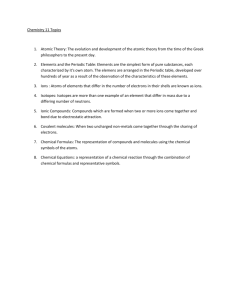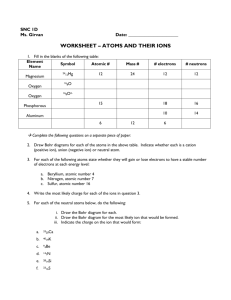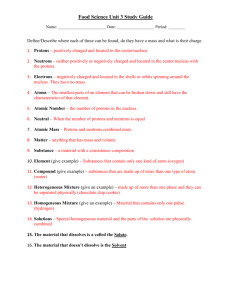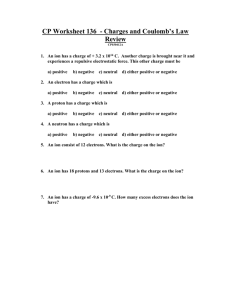PPT 1
advertisement
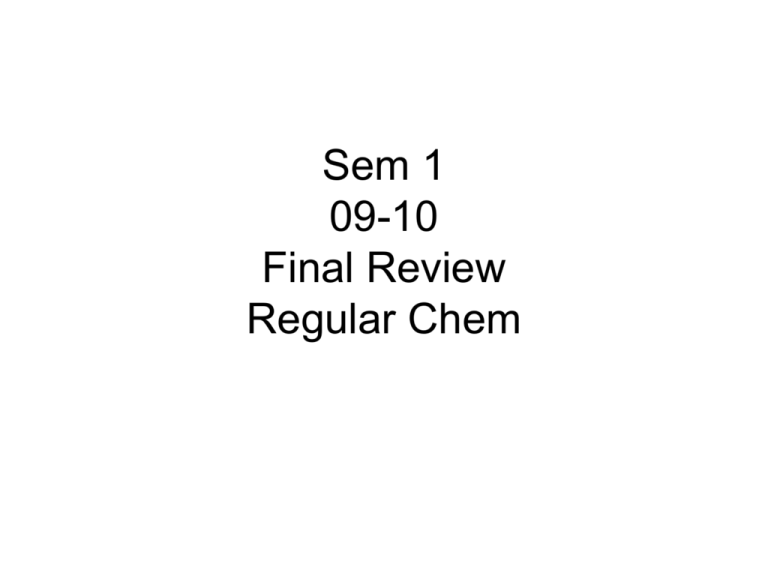
Sem 1 09-10 Final Review Regular Chem 1 • When elements combine to form substances consisting of two or more different atoms 1a chemical compounds 2 • H2SO4 • How many different elements? 2a • 3 3 • H2SO4 • How many total atoms of elements? 3a • 7 4 • 1st energy level holds ? e• 2nd holds ? e- 4a • 2 • 8 5 • Charged particles are called ? 5a • Ions - 6 • Bonds that share electrons are called ? 6a • Covalent Bonds 7 • The elements or compounds that enter the reaction are called - 7a • Reactants 8 • Elements or compounds produced in a chemical reaction are called - 8a • Products 9 • reactants -----> products • What does the arrow mean? 9a • To make or to yield 10 • Balance H2 + O2 -----> H2O • Write the sum of the coefficients 10a 2 H2 + O2 -----> 2 H2O Sum of coefficients is 5 (2+1+2) 11 • Balance Fe2O3 + CO -----> Fe3O4 + CO2 • Find the sum of coefficients 11a 3 Fe2O3 + CO -----> 2 Fe3O4 + CO2 Sum of coefficients is 7 (3+1+2+1) 12 Hydrogen and chlorine react to produce hydrochloric acid • Change to a balanced equation • (remember boot elements are diatomic) 12a H2 + Cl2 -----> 2HCl 13 • What type of reaction is this? 13a • Combination/synthesis 14 • Type of reaction 14a • decomposition 15 • Zinc plus iodine makes zinciodide • Write the balanced equation 15a • Zn + I2 ZnI2 16 • Write the balanced equation for the decomposition of water 16a • 2 H2O 2 H2 + O2 17 • Write the single displacement reaction that makes sodium hydroxide and a gas from sodium and water 17a • 2 Na + 2 H2O 2 NaOH + H2 18 • Sr2+ has how many protons, neutrons and electrons? 18a • 38 protons, 50 neutrons, and 36 electrons. 19 • A certain metallic element forms a compound with chlorine, having the general formula XCl2. The X ion in this compound has 28 electrons. What is element X 19a • Zn 20 • Elements belonging to which group of the periodic table form ions with a 2+ charge? 20a • Alkaline Earth Metals 21 • An ion with a positive charge is called a ___________;a negatively charged ion is called an___________ 21a • cation (pronounced CAT-ion); • anion (AN-ion). 22 • Give the complete chemical symbols for the following ions: (a) The ion with 26 protons, 30 neutrons, and 24 electrons; (b) the phosphorus ion with 16 neutrons and 18 electrons. 22a • (a) The element whose atoms have 26 protons (atomic # 26) is Fe (iron). The mass number of this isotope is 26 + 30 = 56 (the sum of the protons and neutrons). Because the ion has two more protons than electrons, it has a net charge of 2+. Thus, the complete symbol for the ion is 56Fe2+ • (b) By referring to a periodic table or table of elements, we see that phosphorus (symbol P) has an atomic number of 15. Thus, each atom has 15 protons. The mass number of the ion is 15 + 16 = 31. Because the ion has 15 protons and 18 electrons (three more electrons than protons), its net charge is 3-. Thus, the complete symbol for the ion is 31P3- 23 • polyatomic ions are (give an example as well as a definiton) 23a • These ions consist of atoms joined as in a molecule, but they have a net positive or negative charge • Ex: NO3– (nitrate ion) & SO42– (sulfate ion). 24 • atoms gain or lose electrons so as to end up with the same number of electrons as 24a • the noble gases 25 • Predict the charges expected for the most stable ions of barium and oxygen. 25a • Ba 2+ cation. • O 2- anion 26 • Predict the charge of the most stable ion of aluminum 26a • Al 3+ 27 • Which elements are considered diatomic list them 27a • • • • • • • • Boot elements H2 N2 O2 F2 Cl2 Br2 I2 • At 28 • Which of the following compounds would you expect to be ionic: N2O, Na2O, CaCl2, SF4? 28a • We would predict that the ionic compounds are Na2O and CaCl2 because they are composed of a metal combined with a nonmetal. The other two compounds, composed entirely of nonmetals, are molecular. 29 • Which of the following compounds are molecular: CCI4, FeS, P4O6, PbF2? 29a • CCI4 and P4O6 • These are non-metals. • FeS has an electronegativity difference that puts it in the polar covalent range. 30 • What are the empirical formulas of the compounds formed by • (a) Al 3+ and Cl – ions • (b) Al 3+ and O2- ions • (c) Mg 2+ and NO3 – ions? 30a • (a) Three Cl– ions are required to balance the charge of one Al3+ ion. Thus, the formula is AlCl3. • (b) Two Al3+ ions are required to balance the charge of three O2– ions (that is, the total positive charge is 6+, and the total negative charge is 6-). Thus, the formula is Al2O3. • (c) Two NO3– ions are needed to balance the charge of one Mg2+. Thus the formula is Mg(NO3)2. In this case the formula for the entire negative ion must be enclosed in parentheses so that it is clear that the subscript 2 applies to all the atoms of that ion. 31 • (a) Na + and PO4 3– • (b) Zn 2+ and SO4 2– • (c) Fe 3+ and CO3 2– 31a • (a) Na3PO4; (b) ZnSO4; (c) Fe2(CO3)3 32 • How many hydrogen atoms are in CH3CH(CH3)2? 32a • 10 33 • Which of the following are ionic and which are molecular? • • • • K2O CCl4 H2O N2 33a • All are either polar covalent (molecular) or covalent (molecular) except K2O is ionic. 34 • Which of the following compounds is not an ionic compound? • NaF2 SrO GaF3 Cs2O CsCl 34a • All are ionic 35 • Which of the following is incorrectly named, using the rules for binary molecular compounds? • CF4--carbon tetrafluoride • SbCl3--antimony trichloride • C2O5--dicarbon pentoxide • H3As--hydrogen arsenide • NO2--nitrogen dioxide 35a • Trihydrogen arsenide would be correct 36 • • • • • Which of the following is named correctly? barium chloride pentahydrate, BaCl2 6H2O lithium sulfate, Li2SO3 potassium nitrate, KNO2 sodium chlorite, NaClO 36a • barium chloride pentahydrate, BaCl2 6H2O 37 • Which of the following statements is incorrect? Salpeter, KNO3, is really potassium nitrate. Milk of magnesia, Mg(OH)2, is really magnesium hydroxide. Muriatic acid, HCI, is really hydrochloric acid. Lime, CaO, is really calcium oxide. Soda ash, Na2CO3, is really sodium carbonite. 37a • Soda ash, Na2CO3, is really sodium carbonite 38 • Which of these acids has a name that begins with hydro? • HCl HClO3 HClO2 HClO4 HClO 38a • HClO 39 • Which name is incorrectly matched with the given formula? • SO2 : dioxygen sulfide • P2O5 : diphosphorus pentoxide • CO2 : carbon dioxide • H2O : dihydrogen oxide • NH3: nitrogen trihydride 39a • SO2 : dioxygen sulfide 40 • Draw the dot diagram for CH2ClF 40a 41 • Draw the dot diagram for C2H4 41a 42 • Draw the dot diagram for H3PO4 42a 43 • Draw the dot diagram for SO4 2- 43a • 2- 44 • Name this compound • CCl4 44a • Carbon Tetrachloride 45 • Name this compound • H2SO3 45a • Chlorous acid
